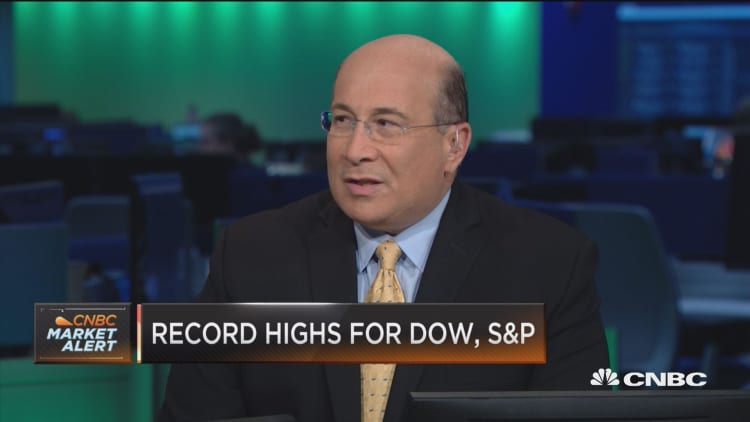
The Dow Jones Industrial Average and hit record highs on Friday and posted solid weekly gains as concerns about global trade dissipated.
The 30-stock Dow rose 86.52 points to 26,743.50 as McDonald's and Boeing outperformed. The S&P 500, meanwhile, closed around the flatline at 2,929.67 after rising as much as 0.4 percent. Both indexes hit fresh all-time highs earlier on the day. For the week, the Dow jumped 2.2 percent while the S&P 500 gained nearly 1 percent.
The the weekly gains pushed the Dow to its first record high since January on Thursday, the same day the S&P 500 posted its first all-time high dating back to late August as investor fears of a full-blown trade war taking place decreased.
"I've been a bit surprised at how robust the rally has been given the chatter on trade," said Michael Geraghty, equity strategist at Cornerstone Capital. He noted, however, equities are also benefiting from strong corporate profits. "The stock market is strong because the economy is strong and the economy is strong because corporate earnings are strong."
The Trump administration announced on Monday it would impose a 10 percent tariff on $200 billion worth of Chinese imports, which would rise to 25 percent by year-end. China retaliated Tuesday by announcing levies targeting over 5,000 American products worth $60 billion and to go into effect next week.
However, these levies were seen as less than feared by analysts and investors, thus helping push stocks back to record highs.
"A full-blown global trade war may yet erupt and derail the global economic expansion, but the odds of such an outcome appear to be diminishing," strategists at MRB Partners wrote in a note, adding this is "spurring a risk-on phase."
"Game theory suggests that even President Trump will want a deal with China, or at least has no incentive to take significant economic risks looking out to 2020," they said. "To this end, Trump has shown that he is willing to do deals, provided he can claim it as a 'win.'"
Investors also braced for an S&P 500 sector reshuffling that will send Google-parent Alphabet, Netflix, Facebook and Twitter to the telecommunication services sector. That sector will also be renamed communication services starting Monday. Disney and CBS will also be added to the revamped space.
The moves will lead to a 21.4 percent loss in market cap for the consumer discretionary sector and a 19.5 percent drop in tech's market value, said Lindsey Bell, investment strategist at CFRA, in a note. Meanwhile, the new communication sector will represent 9.8 percent of the S&P 500, up from the current telecom's size of 2 percent.
"Ultimately, the new communication service sector will better reflect the rapidly changing way the world's population communicates. It will result in a more cyclical, lower yielding sector," Bell said.
Analysts are not expecting a large move when the new sector starts trading on Monday, but some media stocks could garner buying interest as some of the large FANG stocks join the space.
McDonald's shares rose 2.8 percent after the company hiked its quarterly dividend by 14.9 percent to $1.16 per share.
Micron shares dropped 2.9 percent after the chipmaker said PC processor shortages are hurting demand for memory chips, a key business for the company.
Five homebuilder stocks were downgraded by J.P. Morgan, including PulteGroup, sending the space lower. The SPDR S&P Hombuilders ETF (XHB) fell 0.3 percent while PulteGroup shares dropped 0.5 percent. The analysts noted the housing recovery will be "tepid."



